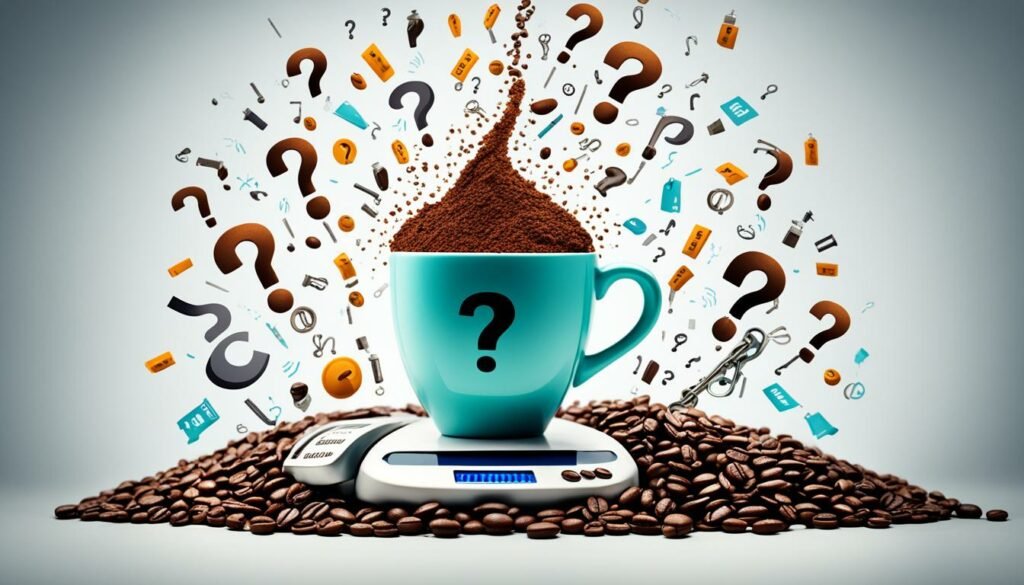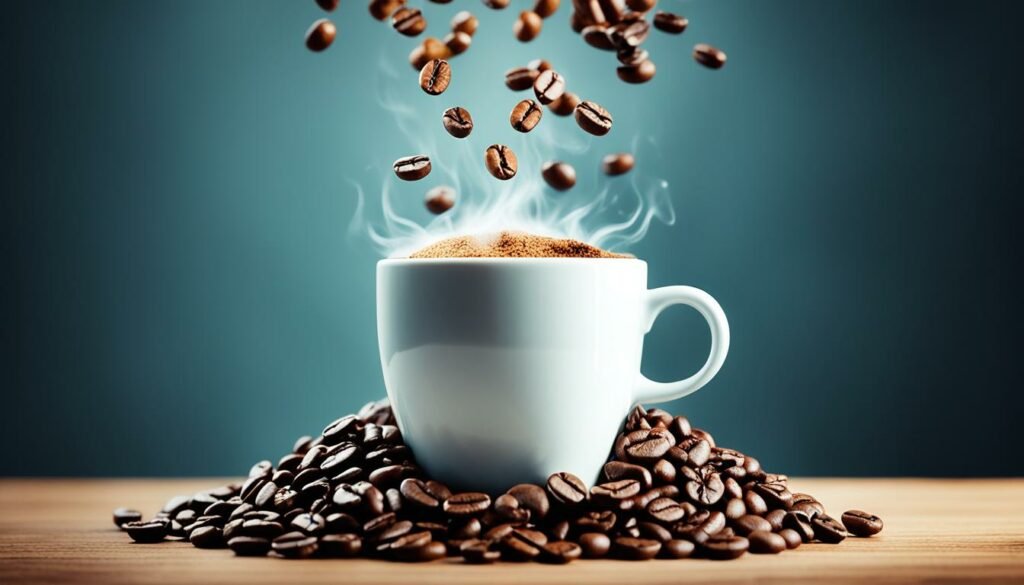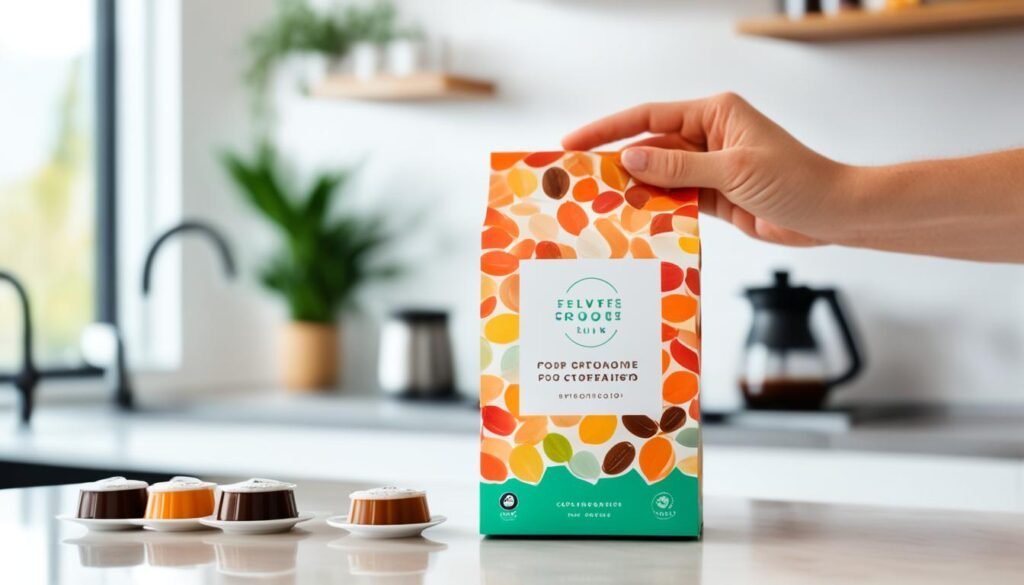Do you know coffee ranks second in trades after oil? It’s true! Over 400 billion cups of coffee are consumed each year. This makes coffee very important around the globe. Yet, many myths and facts about coffee beans are out there. These stories hide what makes coffee special.
There’s a lot to learn about coffee, like where the beans come from and how they are roasted. You can also learn about the different flavors of coffee, the types of beans, and how coffee is grown in a good way. In this guide, we will look at common myths about coffee. We will also explain things like how to store coffee beans to keep them fresh. Plus, we will talk about what makes each cup of coffee taste unique.
Introduction to Coffee Bean Myths and Facts
The story of coffee beans goes back to the 15th century. Such a long time means there are many misconceptions and myths about coffee. By finding out the facts, we learn more about the world. We also become smarter.
Coffee beans are an amazing find. It’s key to tackle the wrong ideas about them. These myths might stop people from really liking and understanding coffee.
Historical Background of Coffee Beans
Coffee beans come from the ancient forests of Ethiopia. A goat herder named Kaldi found them. Since then, coffee beans have traveled to the Arabian Peninsula and on to Europe. This changed how people met and talked.
Importance of Dispelling Myths
Myths make the coffee bean story fun. But, it’s key to know the truth to love this drink more. By clearing up wrong ideas, we can connect with coffee better. We learn to appreciate the hard work behind every cup.
Coffee Bean Myths and Facts
Myths and misconceptions often surround the coffee bean. It’s key to tell fact from fiction. This helps us truly value the rich world of coffee. Let’s start by knowing what a myth really is.
What is a Myth?
The Oxford English Dictionary says a myth is a “widely held but false belief or idea.” Myths touch many parts of our lives. Knowing what a myth is helps us separate the untrue from the true.
Examples of Non-Coffee Related Myths
First, let’s look at some myths not about coffee. Many still believe these myths:
- Dogs can only see in black and white (false – they see colors like yellow, blue, and gray).
- Dropping a penny from the Empire State Building can kill a person (false – a penny can’t reach a lethal speed).
- Cracking your knuckles causes arthritis (false – no proof of this).
These examples show myths can be deeply rooted. As we look at coffee bean myths and facts, open your mind. Let’s be ready to question what we think we know.
By learning the truth, we can love coffee beans even more. We’ll discuss their growth, how they’re roasted, and their flavors. Let’s discover specific coffee bean myths and facts together.
Debunking Popular Coffee Myths
Many think coffee makes it hard to sleep, but that’s not exactly true. Yes, coffee has caffeine, a stimulant that wakes up your brain. But, it’s okay to have about 400 milligrams of caffeine a day and still sleep well. Drinking too much coffee before bed might make it hard to fall asleep. It’s the timing that’s important, not the coffee itself.
Coffee Causes Insomnia
The idea that coffee stops you from sleeping comes from how caffeine works. Caffeine makes you more alert and awake. But, it doesn’t mean you won’t be able to sleep if you drink coffee in the morning. Many can drink coffee earlier in the day and still sleep just fine.
Tips for Better Sleep
Having trouble sleeping? There are lots of ways to get better sleep, even if you drink coffee. First, keep a regular sleep schedule. Go to bed and wake up at the same time daily. This includes the weekends too. Also, make your bedroom a place that’s cool, dark, and quiet.
You should also work on reducing stress or worries that keep you up. Things like working out, meditation, or just relaxing can improve your sleep. And remember, don’t have caffeine close to bedtime. This can mess up your sleep cycle, making it hard to sleep.
| Sleep Tip | Description |
|---|---|
| Consistent Sleep Schedule | Go to bed and wake up at the same time each day. |
| Relaxing Sleep Environment | Keep your bedroom cool, dark, and quiet. |
| Stress Management | Practice relaxation techniques like meditation or yoga. |
| Limit Caffeine | Avoid consuming caffeine close to bedtime. |
With these sleep tips and knowing the truth about coffee bean myths, you can have your coffee and a good night’s sleep.
Coffee Causes Dehydration
A popular belief says coffee makes us lose water. Yet, nothing is farther from the truth. Coffee is mostly water, 98% to be exact. So, it helps hydrate you, not make you dry.
Health Benefits of Hydration
Being hydrated is key for feeling great and staying well. Proper hydration does a lot of good for us:
- Regulating body temperature
- Lubricating joints
- Preventing infections
- Improving sleep quality
- Increasing mental cognition
Now that we know coffee doesn’t dehydrate, we can count it as water. This means we get more health benefits from drinking coffee.
| Hydration Benefit | Description |
|---|---|
| Temperature Regulation | Proper hydration helps with body temperature control. This leads to better metabolism and physical abilities. |
| Joint Lubrication | Being hydrated keeps our joints moving smoothly. That lowers the chance of getting hurt. |
| Infection Prevention | Enough water helps our body fight off germs. This makes us less likely to get sick. |
| Sleep Quality | Not drinking enough water can mess with our sleep. But, being hydrated makes our sleep better. |
| Cognitive Function | Staying hydrated is huge for thinking, remembering, and our brain working well overall. |
Seeing coffee as part of our water need is great. It lets us enjoy coffee while getting the benefits of being hydrated.
Coffee Will Help You Lose Weight
One common coffee bean myth says coffee can help you lose weight. But, there’s no strong proof for this. Caffeine gives a quick energy lift. Yet, it doesn’t seem to make people lose weight for good.
Research has looked into coffee and how it affects weight. It found that a balanced diet and exercise are key. Just drinking coffee won’t make you shed pounds over time.
Many people like the idea that coffee alone can help them slim down. This belief is attractive because coffee is popular. But, it’s important to be realistic. We should not depend on coffee for our weight loss goals. Instead, we should work on healthy habits for our bodies.
Coffee Can Sober You Up
Many think coffee can make you sober after alcohol. But this is not true. Debunking coffee myths helps us know the real facts about it.
Coffee and Sobriety
Coffee might make you feel less drunk after alcohol. This is because caffeine fights against alcohol’s effects. But, it doesn’t lower how much alcohol is in your body. Coffee bean myths and facts can wrongly make people think they’re okay to drive or decide things after drinking.

It’s interesting that coffee and being sober are linked for some who quit drinking. About 90% of the people in Alcoholics Anonymous drink coffee. Researchers are looking into this to see if there’s really a connection. This shows a deep link between coffee and alcohol.
We should know that coffee won’t sober us up after drinking. It might make us more alert, but we’re still not okay to drive or decide well. Debunking coffee myths is important to stay safe.
Coffee Bean Myths and Facts
Coffee is a famous psychoactive drink known around the world. It has a rich history since the 15th century. Many people and steps are involved in making your coffee. This includes big companies, roasters, shippers, sellers, and the hardworking farmers.
The way coffee beans are grown and made has a big impact on its taste. There are different kinds like arabica and robusta. There’s also fair trade and sustainable farming. All this affects how your coffee tastes.
How coffee is roasted matters a lot too. It changes the beans into the tasty and smell-good coffee we love. You might like a light or dark roast. But knowing about roasting helps you enjoy your coffee even more.
Keeping your coffee beans fresh is important for great taste. From the farm to your cup, many steps are taken to keep the coffee fresh. And each step is vital.
- People have loved coffee for centuries. But its story and flavors are always changing and growing.
- Learning the truth about coffee myths and facts helps us enjoy this drink we love even more.
| Myth | Fact |
|---|---|
| Coffee causes dehydration | Coffee is 98% water and won’t dehydrate you. |
| Dark roast coffee has more caffeine | Caffeine is the same in all roasts, but they taste different. |
| Coffee is highly addictive | It’s easy to cut back on caffeine without lasting effects. Coffee is not a huge addiction risk. |
Exploring the world of coffee means sorting truth from myth. This helps us enjoy our coffee more. We can understand and love all that goes into every cup.
Coffee is Addictive
Many people think coffee is very addictive and bad for health in the long run. But, even though caffeine can be addictive, any bad feelings from stopping last a short time, maybe a day or two. Drinking coffee doesn’t lead to bad mental, social, or financial problems, whether you keep drinking it or stop.
Caffeine and Addictive Properties
Coffee has caffeine which makes it seem a bit addictive in the short run. But if you drink it in moderation, there’s no big risk to your health long term. Quitting coffee might give you a headache or make you feel tired for a bit, but it gets better quickly, in a couple of days.

Unlike alcohol or illegal drugs, caffeine in coffee is not as strong and it’s legal. It’s unlikely that you’ll become very physically or mentally hooked on coffee. This means, you can enjoy your coffee without much worry about addiction.
Looking at coffee and its possible addiction risks needs a careful view. While it’s true that caffeine can get you used to it, if you drink coffee in a balanced way, you should be okay. Coffee isn’t as addictive as many think. Let’s enjoy our coffee, knowing it can be part of a healthy diet.
Coffee Stunts Your Growth
People have long said coffee bean myths and facts that drinking coffee stops kids from growing. But, science doesn’t back this up, and a study linking coffee with weak bones was shown to be wrong.
Actually, how tall you get comes mostly from your family. Coffee bean myths and facts don’t have a big effect on this. Eating well, having good hormones, and staying healthy matter more for growing up.
Coffee and Children
Drinking coffee doesn’t make kids shorter. But, remember, kids under 12 don’t deal with caffeine like adults do. Too much caffeine can make kids grumpy, mess with their moods, and keep them from sleeping well, especially teens. So, it’s best for young kids to stay away from caffeine.
Cultural Perspectives
Coffee and kids changes depending on where you are in the world. In Europe, Central America, and South America, it’s cool for people of all ages to drink coffee. Doctors there say a little is okay for kids. In the United States, seeing young children drinking coffee is not common. Health advice here follows that idea.
So, while it’s good to clear up debunking coffee myths, the key is to be wise. Look at how much and when kids drink coffee, based on where they are from.
Dark Roast Coffee Has More Caffeine
Many people think dark roast coffee has more caffeine. But, it’s not true. Dark and light roasts actually have similar amounts of caffeine. The way beans are roasted doesn’t change their caffeine levels much.
Roasting Process and Caffeine Content
When coffee beans are roasted, they lose moisture and get less dense. Yet, the caffeine in them stays the same. In darker roasts, beans get lighter, but they actually have more caffeine per bean. This is because they lose mass during roasting.
One study looked at light and dark roast beans. It found that they had a similar amount of caffeine. Even though dark roasts are less dense, they don’t have significantly more caffeine than light roasts. This means, in a pound of coffee, the caffeine amounts are alike.
Also, remember that caffeine in coffee can change. It depends on the type of bean, how and where it’s grown, and how it’s brewed. But, the roast level doesn’t make a big difference in caffeine.
- If you measure coffee by scoops, light roast may seem to have more caffeine. This is because the beans are denser.
- However, if you weigh the coffee, dark roasts weigh less but might have a bit more caffeine.
- The actual difference between caffeine levels of light and dark roasts is very small. It’s not something you’d notice in your morning coffee.
Knowing about how roasting affects caffeine helps us choose the coffee we like. And, we get to understand the different tastes that come with light, medium, and dark roasts.
Conclusion
We learned a lot about coffee bean myths and facts. We found out that many things people say are wrong. Like coffee doesn’t really make you sleepless or dried out. It also doesn’t help you lose weight or stay sober. By debunking these myths, we see coffee in a new light.
If you love coffee or are just starting to, it’s good to know what’s true. Knowing fact from fiction helps you enjoy coffee more. You can now choose wisely and understand about where the beans come from. Also, how they’re roasted, and the different tastes they have.
Let’s keep learning about coffee. Let’s enjoy the real facts and not get caught up in wrong ideas. With an open and curious mind, we can make our coffee times better. We’ll value every cup knowing the amazing trip coffee beans take from field to mug.












